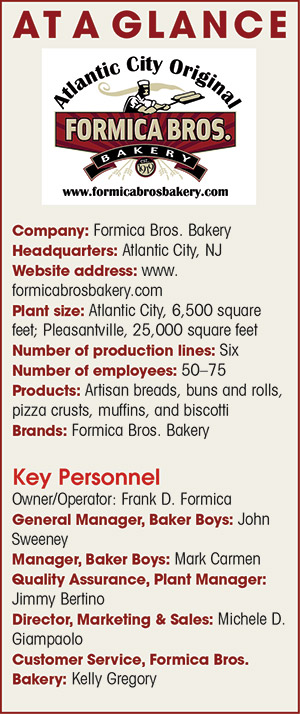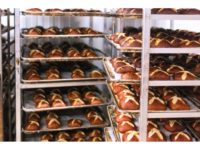New Jersey is home to a fantastic array of sandwich diversity. The state’s definitive ham sandwich, the pork roll, dates back to the 1850s (make it with an egg and a slice of American cheese and it’s known as “Jersey breakfast”). Its sloppy Joe, originating in the 1930s and named after a bar in Cuba, is more of a Dagwood-Cuban hybrid than what folks outside of Jersey would typically expect. Rippers star deep-fried hot dogs that get their name from the split typically formed from the frying process. The aptly named “fat sandwich” can feature any number of ingredients hanging around in the back of the house—beef, chicken, mozzarella sticks or jalapeño poppers, bacon, french fries, cheese and any number of sauces—somehow served on a bun. And while nearby Philadelphia is famous for the cheesesteak, it also graces the menu of many a New Jersey sandwich shop.
But the real star of the New Jersey scene is Atlantic City’s authentic Italian submarine sandwich. White House Sub Shop has been serving up the subs since 1946, and Formica Bros. Bakery, Atlantic City, is a primary bread supplier to the business, conveniently located right across the street.
Formica Bros. got its start in the back of an Atlantic City grocery store in the early 1900s, with the business formally organized in 1919, eventually building a dedicated bakery in 1928. Its sub sandwich bread was the first product out the door. The deceptively simple recipe remains the same today—and has served as an instrumental catalyst that, through the years, helped propel Atlantic City sub sandwiches to widespread fame. The long-fermented bread combines a signature sturdy, crunchy crust and a uniquely soft—yet resilient—crumb, with a flavor that instantly distinguishes it from mass-produced imitators.
Today, that original Atlantic City bakery still stands—and its sub bread is still its top-seller. But Formica Bros. has expanded well beyond sub loaves through the help of a second bakery in Pleasantville, just a few miles northwest of Atlantic City, with a business model that encompasses retail, foodservice and co-packing. The bakery’s artisan sense of flexibility is a hallmark of its approach—one that has served the business well through its nearly 100 years of existence.
A history of endurance
Decades before the automobile transformed American wayfaring sensibilities, railroads ruled transportation, often fueling economic growth along their lines. In 1854, a rail line from Philadelphia to the newly incorporated seaside site of Atlantic City, located on Absecon Island, saw completion. The first official road from nearby Pleasantville to Atlantic City was completed in 1870—the same year city planners built the first boardwalk along the shore. A second rail line was added five years later to meet demand. Atlantic City was entering a boom period of growth.
Formica Bros. got its start just as Atlantic City hit its golden age. Prohibition passed into reality during 1919—a boon for the city then dubbed “The World’s Playground,” where speakeasies thrived and the wheels of entertainment continually spun.
“Francesco and Rosa Formica—grandparents of Frank D. Formica, the bakery’s current owner/operator—began the business after emigrating from Sicily,” says Michele D. Giampaolo, director, marketing & sales. “Francesco, when he first arrived to the U.S., worked on the railroads in order to save up enough money for his fiancée, Rosa, to come to the U.S. It took 12 years, and the day she arrived, they were married—and the next day, along with Francesco’s brother, Santo, they opened up a grocery store on Mississippi Avenue in Atlantic City in the Italian section known as Ducktown.” It wasn’t long after opening the grocery store that they started to bake bread.
Demand was strong, and the bakery side of the grocery’s business grew. “By 1925, they couldn’t make enough bread,” says Frank Formica. It was time to build a dedicated bakery, at a site on Arctic Avenue—the same location in operation today.
A new oven was the starting point for the bakery. “They contracted to have a Petersen oven built, which was fired in 1927, and then they built the building around it,” says Formica, “much like they build a cathedral around an organ.”
The bakery opened for business in 1928, featuring the largest coal oven on the East Coast, notes Giampaolo.
The oven fired from 1927 to 1989. “It never lost its coal fire,” says Formica. “The oven was about 20 feet wide and about 18 to 25 feet long. It was a brick hearth oven with four doors. And it was everything. It was the heat for the building. It was the hot water. It was the steam. It was the baking energy, all out of coal.” Rosa would let women from families in the neighborhood bake off their own dough in the oven for 1 cent.
“From that point, 1927–45, my grandfather, my grandmother, my two aunts, my father and my two uncles ran that bakery until World War II,” says Formica. “All three Formica sons went off to war, and when they returned, Francesco gave them the bakery.”
But the allure of Atlantic City wasn’t as strong after the war. The golden age of the automobile saw leisure-seekers often set sights for destinations further afield. Those who still visited Atlantic City and its famous boardwalk had shorter stays, and the economy slipped.
The resort destination eventually rebounded. In the 1970s and ’80s, legalized gaming hit Atlantic City, and the area saw a dramatic rise in its casino business. Subsequently, bakeries throughout the area fought to capture the increasing demand. So Formica Bros. diversified its capabilities with new artisan bakery equipment and hired a new head baker, John Sweeney—now general manager of its Baker Boys co-packing business in Pleasantville—to capture more of this lucrative business.
All along the way, Formica has worked to improve the economic climate of Atlantic City. He founded and serves as president of the Ducktown Revitalization Association, a neighborhood organization established in 1991 that advocates for a better business and residential quality of life in Atlantic City. He’s also current chairman of the Atlantic County Board of Chosen Freeholders, the county legislature.
A moment of brilliant insanity
“I grew up in the family business,” says Formica. “The first job my grandmother Rosa gave me, at the age of 6, was to sweep out the bakery.” Years later, at age 19 and after he was fully immersed in the bakery industry, he started the Venice Bakery around the corner from Formica. He later sold that bakery, and for a short period of time left the bakery business to start Resorts Casino in Atlantic City.
“In 1987, my uncles and father called me and said they were going to sell the family business,” says Formica. In what he calls his “moment of insanity,” he bought the bakery. “There’s something important about carrying on a family legacy and keeping alive the Formica Bros. breads that so many families have grown up eating,” he says. “I wake up every day humbled to be contributing to the local economy and for having the opportunity to keep alive my family legacy and traditions.”
The bakery still had much of the same equipment as when it started in 1928 and needed updating. “When Frank purchased the business, he ripped out the coal oven and replaced it with modern gas, and eventually some electric ovens, in order to modernize the plant and increase the capacity of production,” says Giampaolo.
The casinos have long been significant bakery customers in Atlantic City, but that business took a hit during the Great Recession of 2008–09. In response, Formica Bros. again diversified its business plan to accommodate expansion into new markets, including school foodservice and co-packing, growing its stable of stock-keeping units (SKUs) to more than 300. The bakery also secured new customers in the beachfront resort town of Cape May, on the far southern tip of the state.
Restaurants regularly entice casino visitors, and the culinary bar in Atlantic City continues to rise. Some notable Atlantic City restaurants that feature Formica Bros. bread include Old Homestead Steakhouse location—famous in New York City for over 150 years—in the Borgata Hotel Casino & Spa, as well as the Sammy D’s from noted chef and restauranteur Sam DeMarco in Harrah’s Resort Atlantic City. Buca di Beppo at Bally’s also features the bakery’s breads.
But those Atlantic City submarine sandwiches hold timeless appeal. Longtime local favorite White House Sub Shop, long supplied by Formica Bros., continues to draw sandwich lovers from far and wide—and the shop recently received a nice nod on national television. Restauranteur and TV personality Guy Fieri profiled White House Sub Shop on a January 2016 episode of Food Network’s “Guilty Pleasures” show, citing White House subs as a personal favorite, repeatedly praising the merits of the bread from across the street.
Formica notes that there isn’t a secret recipe for the bread. It’s flour, salt, yeast and water. What makes it different is the care the bakery puts into the proofing process, which builds strong cell structure and flavor notes not seen in mainstream sub breads. And it’s that texture and flavor that keep customers coming back.
 Diversified strategies
Diversified strategies
While Formica notes that the bakery is undeniably known for its famous Atlantic City sub bread—accounting for more than 30 percent of the bakery’s business—the Formica Bros. catalog offers more than 300 different varieties of individually handcrafted breads, including artisan semolina products like baguettes, brioche, various artisan dinner rolls, ciabatta, focaccia, bâtards, Pullman loaves, biscotti, muffins, flatbreads, pizza crusts and refrigerated dough products.
Its savory-sweet cranberry-walnut-raisin dinner rolls have become the bakery’s No. 2 best-seller. They’re sold to multiple restaurants throughout the area. “Our master baker, Chef John Sweeney, is really keen on savory and sweet,” says Formica. “The cranberry gives it a little pungency—you get a little bit of that sharp taste. It was his recipe.”
Formica Bros. has also seen considerable success from translating its hot-dog-style bun typically used for lobster rolls into a burger-style bun. “It has a very light, sweet flavor to it,” says Formica. “And the crumb is almost pure white. It’s one of our best-sellers.”
The past decade has comprised a mission of innovation in the face of adversity. “With the downturn of the economy, specifically the casino business in Atlantic City, we have had to both expand our product line and geographic areas served,” says Formica. “A few years ago, we developed a line of 100 percent whole-grain products that we now sell to federally funded public schools to meet government nutritional requirements.” The line, which includes a sub bread, features whole-grain white-wheat flour. “It looks almost exactly like our regular sub bread,” he says. “And we actually used the dough to create a wildly successful dinner roll. We sell it to a number of casinos.”
Co-packing has also provided a source of diversified revenue for Formica Bros. The Pleasantville bakery is home to Baker Boys, a wholly owned subsidiary originally established with Ginsburg Bakery that focuses on co-packing. While Formica Bros. now owns the bakery outright, Baker Boys continues to co-pack and distribute Ginsburg’s breads, English muffins, bagels and muffins. “We are putting a tremendous amount of focus on our co-packing capabilities,” says Formica. He points to private label as another area of potential growth in the coming years, along with continued expansion into school foodservice.
The bakery features six lines dedicated to artisan dinner rolls and sandwich breads, Pullman loaves, baguettes, muffins, ciabatta and Italian breads. The historic Atlantic City bakery focuses on Atlantic City sub breads, pizza shells and soft Philadelphia hoagie rolls, as well as a line of biscotti.
One recent investment was the installation of a flour silo delivery system at the Pleasantville bakery, which improves the bottom line through bulk flour sourcing and improved efficiency. Formica also customized a new line of ovens with brick and stone to better replicate indirect hearth baking. The bakery’s ciabatta line recently invested in new technology to modernize and standardize production within tighter specifications. Another project in the works is a new 2,000-square-foot refrigerator designed to slowly ferment dough and provide more flexibility in quickly responding to customer orders.
Formica notes that expansion into the capability to freeze products is also potentially on the horizon. “We recognize that there is an increased focus on inventory management and waste in the food industry, and customers are now looking for frozen breads that they can either finish off themselves and or thaw and use,” he says. “We recognize this and are strategizing how to best embrace the future, but without losing our roots and the traditions that have made our breads so famous.”
Formica Bros. sells bread to supermarkets and grocery stores, restaurants and sub shops, airports, racetracks, casinos and schools. The bakery also works with a wide range of corporate and institutional foodservice customers. It delivers to an average of 500 customers every day. The bakery owns, operates and maintains some of its distribution network, and contracts some business out to other distributors.
The bakery continues to make acquisitions to grow its business and overall capabilities—a necessity in order to meet the needs of an increasingly diversified customer base with a wide variety of superior baked goods.
“At the end of the day, there’s nothing that’s much different than when my grandfather started the business and was delivering with a horse and wagon,” says Formica. “It’s got to be consistently excellent service and consistently excellent products.”
Formica points out that one of the bakery’s biggest accomplishments is its longevity: “After 100 years in the bakery industry, we have survived many twists and turns. Our doors are still open, and we are making bread. We continue to enter into new markets, sign up new customers and create new breads—all while staying true to our traditions, not losing focus on where we have been and still looking to the future. We have seen bakeries go out of business all around us, choosing not to serve customers in this area. We’ve done the exact opposite. We are rolling into the future and rising to the challenge, one loaf at a time.”










